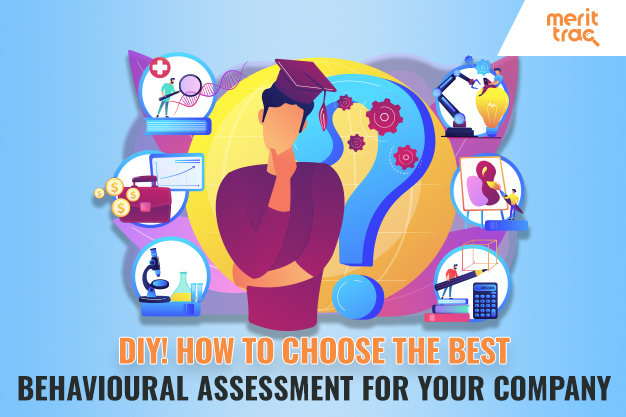
DIY! How to choose The Best Behavioural Assessment for your company
Date: 22/10/2019 | Posted by: Meghana Jitendra | Category: Behavioural Assessment , Corporate
Leveraging psychometric assessments, especially for personality and other behavioural components, for recruitment as well as workforce development, is becoming a popular practice in organisations today. Many companies are seriously investing in psychometric assessments because of the promising ROI of these assessments.
But, given the voluminous availability of behavioural assessments, the task of choosing the right-fit of assessments for the requirements of the company may start feeling like a mammoth task for several HR professionals. So, what do you do when your vendor presents you with that impressive but extensive catalogue of behavioural assessments? You use tips from this blog to help you choose the best behavioural assessment for your company.
There are several secret ingredients to look for in the recipe for the worthiest assessment for your company.
-
The Objective: Understand why you want to use the behavioural assessment and to measure what competencies. Assessments can be used for screening as well as selection. Some recruiters place assessments in the first level of the screening process to derive at a list of ‘the chosen ones’ for further rounds of interview/s, while some other use behavioural assessments at a later stage in the selection process on a small group of shortlisted candidates to gain more insight into their candidature. In case of workforce development, HR professionals may use behavioural assessments to identify candidates for training or movement to other suitable roles. Knowing why and where to use the behavioural assessment would guide the HR professional to look for the right one.
-
The Elements: Familiarising oneself with the components of the behavioural assessments, in terms of what it measures, what dimensions are covered, what are the type of questions and response options, what is the range of behaviour covered in the assessments, etc., would help map the assessment parameters to the competencies sought to be measured. Reliability and validity of the assessment are, of course, important to consider.
-
The Report: Look at the kind of report you would get after the candidate takes the tests. A good behavioural report would provide meaningful insights, highlighting strengths, guide further inquiry during interviews and present a holistic view of the personality of candidate. The report should also be comprehensible, where it can be easily interpreted by the reviewer.
-
The Execution: Nobody likes filling out a long questionnaire. The length of the test is to be considered not only from the perspective of test taker’s experience, but also the administrative and logistical concerns. This doesn’t mean you choose the shortest behavioural assessment you can find; the assessment should be well-rounded, and the length of the test should be justified by the scope of the test items in terms of the range of behavioural traits covered and the kind of insights provided by the assessment report. The mode of administration, user experience, visual interface of the test, and so on add brownie points in the selection of an assessment.
-
The Target: Each assessment is designed with an audience in mind. Identify the audience the test is designed for and if that intended audience includes the population you intend to test. Evaluate the suitability of the assessment to your audience in terms of relevance of test content, literacy/comprehension levels/vocabulary, cultural backgrounds, kind of insights provided in the report, suitability to occupational level, etc. Pro-tip: Take the test yourself or give it to someone similar to the person you’re hiring and review the relevance of the assessment to the intended audience.
-
The Industry: Determine whether you want to use a generic behavioural assessment or an industry-specific one. Gauge the relevance to the assessment to the industry and/or the role. Some HR professionals insist their assessment vendor to customize the assessment to suit your requirements, however, that is not recommended, as behavioural tests are designed based on strong theoretical and research foundation and are intentionally designed the way they are.
These, of course, are some of the ingredients. You add your own ingredients to find your perfect recipe for the best behavioural assessment for your company. Because, we always “add salt to taste.”












 Sales Hotline: USA: +1 646 916 0939 / Others: +91 80619 14700
Sales Hotline: USA: +1 646 916 0939 / Others: +91 80619 14700


